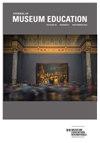The Power of Words
IF 0.6
Q3 EDUCATION & EDUCATIONAL RESEARCH
引用次数: 1
Abstract
Well before words mattered in the museum, they had grave consequences for Socrates. After all, he died for them. For Socrates, language’s danger lies in its pliability; the power of rhetoric to convince without the aim of truthfulness reveals the pernicious potential of words. In Phaedrus, Socrates critiques rhetoricians whose facility with language allows them to convincingly lie; the language that persuades can also deceive. Casting the sophists as charlatans, Socrates argues that a facile use of language without a love of truth endangers society. Understanding the techniques of language— rhetoric—allows us to differentiate between truth and that which simply masquerades as truth, between opinion and fact. The use of the written word was particularly suspect to Socrates, but he was not, contrary to common perception, critical of writing per se. Rather, he recognized its dangers; writing cannot reply like a teacher, but it can be moved, re-situated, and shifted. It cannot differentiate between those who read and understand and those who read and do not. Socrates tells us not to destroy the written word, but to enliven it through living conversation and dialogue. In the context of this journal, whose medium is the written word, we as educators, writers, and thinkers must take heed of this warning. This issue of the journal focuses our attention on the power of words in the museum, with a strong focus on the written word. It asks us as educators to think carefully about how we write and engage with language in our work, while itself meditating on the power of the written word to record our work and create dialogue in our profession. Famously, Socrates wrote nothing himself; all our knowledge about what and how he taught comes through his student, Plato. In this way, educators often parallel Socrates— we teach but rarely record what we do, relying on engagement in the galleries rather than the written word. Jacques Derrida explored the irony of the fact that Socrates’ truth and critique of the written word comes to us through that same medium, through dialogues created by his student that appear real but may well be inventions. For Socrates, these dialogues are knowledge, the passage of meaning through ideas and things, something achieved through active engagement with a subject. Dialogue in the Socratic sense is not an act of replacement of an old, dead meaning with a new one as in the Hegelian dialectic; rather dialogue is about a living, multidirectional, shifting meaning. Art historianWendy Shaw has noted that Plato’s definition of knowledge as dialogue, flexible and agile as language itself, sits uncomfortably within the museum:语言的力量
早在文字进入博物馆之前,它们就对苏格拉底产生了严重的影响。毕竟,他是为他们而死的。对苏格拉底来说,语言的危险在于它的灵活性;修辞在不以真实为目的的情况下说服人的力量揭示了言语的有害潜力。在《斐德罗斯》一书中,苏格拉底批评修辞学家,他们的语言能力使他们能够令人信服地撒谎;说服人的语言也会骗人。苏格拉底认为,如果不热爱真理而轻易使用语言,就会危害社会。理解语言的技巧——修辞——可以让我们区分真理和伪装成真理的东西,以及观点和事实。苏格拉底特别怀疑书面文字的使用,但他并没有与一般人的看法相反地批评文字本身。相反,他认识到了文字的危险;写作不能像老师一样回复,但它可以被移动、重新定位和转移。它无法区分那些阅读并理解的人和那些阅读并没有阅读的人。苏格拉底告诉我们不要破坏书面文字,而是要通过生动的对话和对话来活跃文字。在这本以文字为媒介的期刊的背景下,我们作为教育工作者、作家和思想家必须注意这一警告。本期杂志将我们的注意力集中在博物馆中文字的力量上,重点关注书面文字。它要求我们作为教育工作者仔细思考我们如何在工作中写作和使用语言,同时思考书面文字记录我们的工作和在我们的职业中创造对话的力量。众所周知,苏格拉底自己什么也没写;我们所有关于他教什么以及如何教的知识都来自他的学生柏拉图。通过这种方式,教育工作者经常将苏格拉底相提并论——我们教书,但很少记录我们所做的事情,依赖于对画廊的参与,而不是书面文字。雅克·德里达探讨了一个讽刺的事实,即苏格拉底的真理和对书面文字的批判是通过同样的媒介,通过他的学生创造的看似真实但很可能是发明的对话来到我们面前的。对苏格拉底来说,这些对话是知识,是通过思想和事物传递意义,是通过积极参与一个主题而实现的。苏格拉底意义上的对话并不是像黑格尔辩证法那样用新的意义取代旧的、死的意义;相反,对话是关于一种活的、多方向的、不断变化的意义。艺术史学家Wendy Shaw指出,柏拉图对知识的定义是对话,就像语言本身一样灵活敏捷,在博物馆里令人不安:
本文章由计算机程序翻译,如有差异,请以英文原文为准。
求助全文
约1分钟内获得全文
求助全文
来源期刊

Journal of Museum Education
EDUCATION & EDUCATIONAL RESEARCH-
CiteScore
1.20
自引率
16.70%
发文量
34
期刊介绍:
The Journal of Museum Education (JME) is the premier peer-reviewed publication exploring and reporting on theory, training, and practice in the museum education field. Journal articles—written by museum, education, and research professionals—explore such relevant topics as learning theory, visitor evaluation, teaching strategies for art, science, and history museums, and the responsibilities of museums as public institutions. Published 4 times a year, each issue consists of a guest edited section focused on a specific theme and articles about new research, current trends, tools, frameworks, and case studies, perspectives, and book, exhibit, and program reviews.
 求助内容:
求助内容: 应助结果提醒方式:
应助结果提醒方式:


